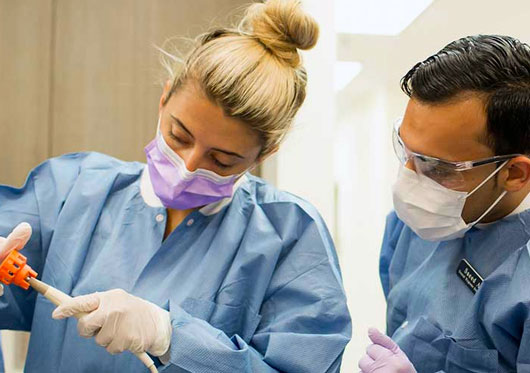The practice of dental hygiene can be physically demanding. Students should be in good physical condition and be able to perform the following essential functional requirements.
Motor Skills
- Perform CPR.
- Lift and carry up to ten pounds.
- Retrieve dental supplies from storage areas at different heights.
- Reach overhead equipment to a height of five feet.
- Rotate and reach laterally, standing or sitting.
- Perform for a prolonged period without breaks, e.g., typical shift of eight hours.
- Manipulate mechanical and patient care equipment, i.e., dials, switches, push buttons, keyboards, syringes, and blood pressure equipment.
- Maneuver in tight quarters, common to dental offices.
- Use dental instruments with precision and control in confined areas.
- Pick up items of very small and varying diameters.
- Wear protective equipment such as surgical gloves, lab coats, face masks, face shields, and protective eyewear.
- Function in an environment where latex is present.
- Exhibit sufficient motor function to examine a patient diagnostically.
- Carry out OSHA infection control procedures using cleaners and chemicals.
Sensory Skills
- Differentiate among subtle shades of gray used in radiographic image formation.
- Discern changes in color, texture, and shape of oral tissue.
- Respond to requests and direction.
- Perceive and interpret tactile vibrations appropriately.
- Elicit information from a patient by palpation, auscultation, percussion, and other diagnostic modalities.
- Observe demonstrations at a distance and close at hand.
- Have appropriate depth perception from a distance of 18 inches with or without corrective lenses and be able to comprehend three-dimensional relationships.
Intellectual Skills
- Integrate, analyze, evaluate and synthesize data.
- Possess the intellectual abilities required to carry out reasoning, analysis, problem-solving, critical thinking, and self-evaluation.
- Effectively communicate (verbally and in writing) with patients, faculty, and team members in English.
- Be aware of possible exposure to hazards such as dental materials, radiation, blood and body fluids.
Behavioral Skills
Students should possess the emotional health and mental stability necessary to:
- Demonstrate respect and caring for patients, peers, staff, and faculty in a professional and ethical manner
- Demonstrate respect for the diversity of cultures among patients, college personnel and peers
- Demonstrate a team approach in carrying out responsibilities in all settings
- Endure physically-taxing workloads
- Function effectively under stress and adapt to changing environments
- Be able to accept criticism and respond by appropriate modification of behavior
- Demonstrate collegiality among faculty, staff and peers
- Exercise good judgment
- Respect the confidentiality of patient privacy
